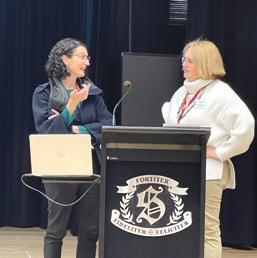
4 minute read
Unstoppable Girls Begin With You
HUMANITIES Change and Continuity
A key focus of the new VCE History course in 2022 is an investigation of change and continuity. In particular, it asks whether the societies involved in the world’s great revolutions really did have a revolution in the way that people lived. Was a Russian peasant living better in 1927, for example, compared to their life in 1900? While most students can identify the incremental improvements that resulted from the revolution, most students end up asserting that there was little material change. An alternate definition of revolution is, after all, one full orbit that returns to its original spot.
Advertisement
The understanding of change and continuity is essential across all Humanities subjects. Geography students can study the long-term change in the environment, for example. Our geographers can graph the trends of a warming climate and see quite clearly the change that has occurred since industrialisation. Perhaps the main continuity they can identify is widespread government inaction. Unlike historians, geographers can analyse historical change and continuity and make predictions about the future which can influence behaviours today. Analysing historical change (improved health outcomes) and continuity (the impact of the One-Child Policy) in China’s human population, for example, leads geographers to predict a rapid aging of the Chinese population over the next 25 years; a tripling of those over 85 and a doubling of those over 65. This sort of analysis allows government policy to pro-actively respond to the projected change, perhaps by encouraging more births and investing more heavily in aged care.
Commerce students also investigate the notion of change and continuity in the classroom. In Legal Studies students look at precedent and the legal continuity it provides in our societies. While continuity in the law can provide certainty, there must be law reform that responds to the changes in our evolving society. Our Year 12 students study the case of NSW Registrar of Births, Deaths and Marriages v Norrie (2014) which led to the High Court ruling that the Registry did have the power to record a person’s gender as neutral on official documentation. This has led to widespread legal change across Australia in other jurisdictions. Strathcona’s Economics students will currently be studying how continuous low interest rates and inflation in Australia has suddenly changed in 2022, and what impact that will have on both the Australian economy and household budgets.
The study of change and continuity is an essential part of what it is to be a student of the Humanities — a critical thinker. In objectively analysing and evaluating a broad range of evidence in a broad range of disciplines, students learn to form judgements, solve problems and communicate their ideas. These core Humanities skills lie at the very heart of what it is to be an engaged, employable and successful adult in the 21st Century.
SCOTT SWEENEY
Head of Humanities
A FINAL REFLECTION
One wild and precious life
– Mary Oliver
The final line from Mary Oliver’s poem The Summer Day lodged in my mind earlier this year and has resonated with us here at Strathcona Girls Grammar.
Being involved with pastoral care in hospital and school environments during COVID I had time to think about the big questions of life. In pastoral care we ask what gives us community, connection and meaning. COVID has caused long term physical and mental health issues for some people. It has also caused many of us to reflect on what it is we plan to do with our one wild and precious life.
As a Christian Chaplain, counsellor and pastoral carer, I go back to scripture which has lasted somewhat longer than that the social meme wisdom that is around us today. Our faith is about loving God and loving our neighbour as we love ourselves in a positive way. Family, friends and even people who are more difficult to love are all our neighbours according to the Bible.
The prophet Micah suggests we are called to Act Justly, Love Mercy and Walk Humbly with God. (Micah 6:8)
Act Justly, Love Mercy and Walk Humbly is something which is valued and modelled by staff, parents and alumnae and passed on to our students. Our wonderful Strathy Angels make meals for families within our community who are facing a tough time with sickness, grief or loss. This is something which gives meaning to their one wild and precious life. Our students raised money for Women’s Property Initiatives in Victoria and Ukrainian refugees showing love for our neighbours both locally and globally.
At our Faith Assembly we heard from a former Strathcona student, marketer and influencer, Brooke Rutherford (’13). Brooke is now a Youth and Young Adults Pastor. Her faith gives her meaning, connection and community. We also loved getting up and dancing with Yimba Uganda who spoke about the work they do in educating young people in Uganda via courses in trades, sewing, beauty therapy and music. This is what they have chosen to do with their one wild and precious life.
Anne Lamott wrote a book called Hallelujah Anyway: Rediscovering Mercy. Mercy or loving kindness is the childlike ability to be kind to everyone around. We sometimes lose this as we get older and cynical. The scripture verse Act Justly, Love Mercy and Walk Humbly with God is not a bad start to answering the question.
So, tell me, what is it that you want to do with your one wild and precious life?
REVEREND JANET COSTELLO
Senior School Chaplain










